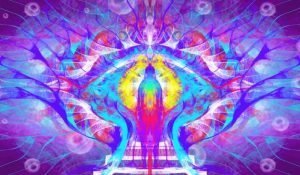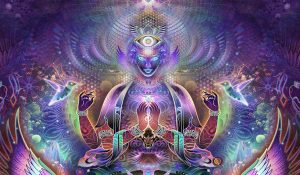Whatever the practice or teaching, the ego likes to ambush the appropriate spirituality for its own survival and gain.
~ Chögyam Trungpa, Cutting through spiritual materialism
Spiritual growth is an experience that we all have once we have experienced the process of spiritual awakening. As we begin to awaken to the truth of who we are, we develop a connection with our authentic essence, our higher nature, or our soul.
As we progressively advance on our paths, our spiritual essence begins to bloom like a luminous flower in the depths of our hearts. And the more we cleanse the dead, gnarled and overwhelmed beliefs, perspectives, and emotional baggage within us, the more clearly we feel our divine essence.
When we maintain our inner garden, we feel more and more love, wisdom, peace, and integrity as our true nature is slowly revealed to us.
However, like any garden, our metaphorical interior landscapes can be consumed by weeds, plagues, and forms of pollution that strangle all that we have fed beautifully. Sometimes we even sabotage the growth that occurs in ourselves, without knowing it.
Table of Contents
What is spiritual growth?
Spiritual growth is the process of awakening to your true nature, your goal, and your potential. When you experience spiritual growth, you experience an expansion of awareness and insight, also known as higher awareness.
All spiritual growth has one goal: to help you embody your soul, your higher self, or Atman. Once you can unite with your soul, you will experience what is understood as enlightenment, “heaven”, oneness or moksha.
It is not a journey to become something. It is about becoming unworthy of who we are not.
~ Adyashanti, The end of your world
The problem with the spiritual journey is that it is often loaded with traps of all kinds. These traps are not physical, but they are rather mental and are often called anti-arousal forces. As we treat life mainly by the spirit, we also tend to approach spirituality with the spirit. The problem with this is that spirituality cannot be contained by the limits of thought.
Once spirituality is captured in a thought, it ceases to retain its true essence and instead becomes a compelling belief or dogma. In other words, spirituality loses its living and always fluid essence once it is compartmentalized in the mind.
Think of it this way: have you ever felt immense fear and wonder at something beautiful and enchanting like a sunrise?
The moment you stop immersing yourself in the feeling of the sunrise and start taking a picture of it or describing it in a text message is the moment when you are no longer really present with the sunrise. Instead, you filter it through your thoughts or through some lens. The same can be said with spirituality.
The more we use the mind to approach our soul, the further our soul feels. But the moment we give up our thoughts and allow ourselves to feel our soul purely, suddenly we feel at home again.
Think of it like this: when you chase the sun on the horizon thinking that you will reach it, you will never do it, because it is an illusion. But when you stop and already feel the presence of the sun shining on your skin, you will no longer pursue anything.
It is difficult for us as spirit-oriented beings to become aware of our thoughts because we have been conditioned to identify with them from an early age. But once we can observe our thoughts and how they tend to sabotage our happiness, we will experience true spiritual growth.
Below, we want to share with you eleven of the most common pitfalls in which we fall on the spiritual path. I have personally experienced these traps many times, and they have caused a lot of pain and struggle. See how many of these traps you can identify with:
1. The trap of spiritual bypassing:
Spiritual bypassing is the practice of using spirituality to avoid, suppress or escape certain emotions or situations in life. Common types of spiritual bypass include:
- numbing their emotions with “spiritualized” repression and avoidance
- unhealthy obsession and attachment to the positive (eg positive thinking) and adoption of a passive-aggressive “pleasant” mask
- debilitating judgment about their negativity or their own shadow
anger-phobia - weak personal boundaries
- blind or overly tolerant compassion (to the detriment of themselves and the other)
- forcefully trying to “kill” the ego and condemning it as “bad/evil”
- exaggerated detachment
- getting stuck in theoretical spirituality and dogmatic beliefs about “truth”
- denial of personal responsibility by placing it on another superior being (eg spiritual guide, angel)
- delusions of having reached a higher level of being
- using spiritual practices to escape unpleasant emotions; for example, using meditation to dissociate from emotions, rather than transmuting them
2. The trap of superiority:
This manifests itself in the tendency to “look down” on those who are not “consciously advanced” or “awake”. The superiority trap can be seen as a subtle feeling of “being better” than others who are not “spiritual”.
In more extreme cases, this trap can appear as the tendency to attack people who are still “asleep”, “blind” or “sheep” of society. This type of reactive behavior can often be seen in people who have just “woken up” to the state of the world, but who have undergone minimal spiritual growth.
We must remember that everyone does their best at their level of consciousness. When the time comes, they will wake up too.
3. The trap of trying to wake others up forcefully:
Once we have awakened from the “matrix,” it is common for us to desperately want our loved ones and peers to awaken. We can see how much suffering and delusion are felt by other people, and this arouses in us an intense desire to “show them the truth”. However, often our attempt to forcefully awaken people is quickly mistaken.
Even if we have good intentions, our desire to “save” others causes them to react in a way that exasperates us and them. The less they are sensitive to our insistent attempts to “wake them up”, the more frustrated and alienated we become.
Ultimately, trying to force others to wake up ends up hurting ourselves and others. Not only that, but this trap generates a lot of anger and misunderstanding, which results in further ensnarement of the ego, sabotaging our spiritual growth. Let people wake up when they are ready.
Recommended: 7 Sings that Mean You Are Undergoing a Spiritual Change.
4. The trap of demanding to help others:
This trap is closely related to the previous trap, except that it is more intended to give advice to others. There is nothing wrong with wanting to help others, as long as you respect their limits.
But sometimes, developing a broader spiritual perspective allows the ego to feel more “knowledgeable” than others still trapped in an illusion. When unsolicited advice is given to others, the results can be disastrous (think of anger, offense, etc.).
Wanting to help others can also be used as a way to escape our need to help ourselves. Helping others may be just another form of spiritual circumvention on the pretext of being “spiritual” and compassionate.
5. The trap of wanting a revolution in the world:
Once we have awakened to the lies and corruption present in our present societal structure, many of us desperately want to change society. We fall into the trap of thinking that freedom, honesty, and justice can be created by changing the external system.
As a result, we subscribe to the mentality of “us against them” and of “divide and rule” which is a product of the tunnel vision of the ego. We don’t realize that we are actually fueling the corrupt system that depends on anger and chaos to thrive and survive.
Instead of understanding that all real change comes from an internal revolution, we find ourselves caught up in the pursuit of an external revolution that is fragile and transitory.
6. The trap of meaninglessness:
Once we experience divine and transcendent states of being in which we become One with all, we can fall into the trap of spiritual nihilism after the experience has passed.
In other words, once we realize, from the Universe’s point of view, that nothing we do ultimately matters because everything goes by, we can fall into a depressed state of mind. By using truths such as “Everything is an illusion”, the person who falls into this trap tends to filter life through the mind.
By mentally clinging to these truths, they become beliefs that the ego uses as an excuse to paradoxically feel separated from existence.
Recommended: 9 Signs that Prove You Are on the Path to True Spiritual Enlightenment.
7. The trap of avoiding your everyday responsibilities:
Some people are so passionate about the spiritual path that they avoid taking care of ordinary and daily business. This form of evasion can lead to leaching off others, not paying bills, tax evasion, the obsession with “living outside the network”, etc.
When avoiding everyday responsibilities is worn as a sign of being consciously high or “more spiritual”, it is also a form of disguised selfishness. Avoiding ordinary responsibilities that are not perceived as being “spiritual enough” can also be a form of distraction that the ego uses to limit spiritual growth.
The more preoccupied and obsessed you are with living a “spiritual” exterior life, the more you move away from your soul work. Sometimes we have to feed the sharks to keep calm and live a balanced life.
Remember the old Zen saying: “Before enlightenment: chop wood, carry water; after the Enlightenment: chop wood, carry water. We must be humble and recognize that ordinary daily life is the perfect place to grow and mature spiritually.
8. The trap of self-victimization:
Shortly after experiencing spiritual awakening and awakening to the folly of the world, it is common for us to get stuck in self-victimization. We can start to perceive the world as a “prison” and other people as “captives” or even “captures”.
The shock of awakening can plunge us into anxiety and paranoia. Inevitably, we can start to feel like victims, which makes us blame others and higher powers for how we feel. The spiritual trap of self-victimization can be seen a lot on social media, which often tends to become a celebration of pity for young spiritual people.
At the end of the day, we must see that it is our thoughts that make us suffer, not others or situations. Once we can take responsibility for our perspectives and our beliefs, we can become self-reliant.
9. The trap of the savior complex:
This trap is linked to the previously mentioned trap of wanting to help others. The Savior Complex is adopted by people who feel a sense of superiority over the rest of humanity. Their feeling of being “different” and more “spiritually elevated” can make them feel like they are meant to repair the world.
The Savior complex can most often be seen in the “lightworker/ star seed/ healer” circles who tend to put themselves on pedestals, believing that it is their cosmic duty to “save the planet”.
This perception aligns with the belief that there is something “wrong” with reality and that other people are “broken” and need to be fixed (which is an ego perspective). This perception also reinforces the feeling of “particularity” and self-importance of the ego.
The Savior Complex can go further and evolve into a martyr Complex. Martyrs believe that they must “carry the burden” of others. Obviously, it is an extremely unhealthy lifestyle that is based on Christian conditioning (think of the story of Jesus). By “carrying” the pain of others, the Martyrs bypass the responsibility for their own happiness and allow others to behave immaturely.
10. The trap of attachment:
After experiencing deep and expansive mystical experiences that often occur after significant spiritual growth, it is common for us to become attached to the experience. It can be painful to come down from these experiences and return to normal, unenlightened reality. We can also attach ourselves to our “stories” and beliefs about spirituality.
Because the mind is trying to make sense of this transcendent experience, it will often cling to various ideas as a form of control. But the more we attach to our beliefs, stories, desires and mental interpretations, the more we suffer.
We forget that everything passes, even transcendent experiences. Enlightenment is not a destination, it is a complete surrender; a fundamental change in the way we approach life.
Attachment is perhaps the most common trap that sabotages our spiritual growth. On the one hand, the attachment to ideas helps us grow, but ultimately, these ideas that we do not want to give up, end up stagnating our growth. When ideas become protective covers rather than catalysts for our growth, there is a big problem.
We have to realize that freedom cannot be experienced by the mind. Freedom is felt when we can be freed from attachment to our thoughts.
Recommended: 7 Differences Between those who Claim to Be Awakened and those who Are Truly Awakened.
11. The trap of relying on external answers:
As we progress on our spiritual paths, it is normal and beneficial for us to seek external support. Read books, attend workshops and seminars, go on retreats, practice holistic techniques, and find a personal guru to help us experience spiritual growth.
However, after a while, it is common for us to become too dependent on external responses for our freedom and happiness. This pitfall can be seen in spiritual seekers’ obsession and glorification of their gurus (in other words, projecting and denying their divinity on another).
Finally, as we get used to constantly looking for answers outside of ourselves, we forget the presence of our own souls.
We forget that our ultimate source of advice and wisdom comes from within us, and instead, we continue to chase things outside of us that we think will “enlighten” us.
We must stop, pause and reflect on our spiritual journeys. Are we looking for first-hand experience or second-hand experience offered to us by others? Do not forget to look inside for your answers because it is by connecting with your soul that you will eventually experience freedom.
Recommended Book for You:
Change your mindset now to achieve great success and get ready to be mind-blown by your own transformation!












